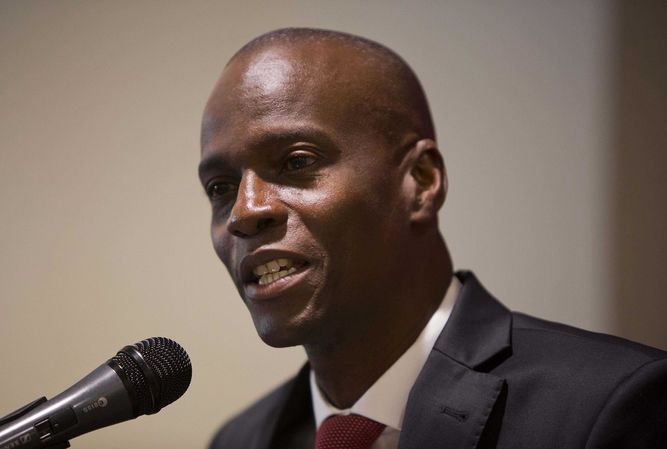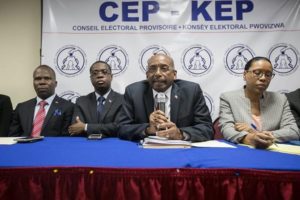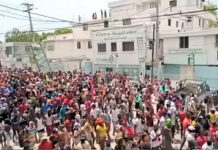
Haiti’s Nov. 20, 2016 elections did not live up to expectations. There was great hope that they would enable the country to emerge from its ever-deepening crisis. Instead, the elections were fraught with fraud and irregularities, sometimes similar but often different from that seen in 2015.
Electoral participation was only about 20%, enabling neo-liberal political parties without a proven program to seize power. Many of those elected are rumored to be drug traffickers, smugglers, and perpetrators of other heinous acts, thus depriving them of legitimacy and respect. The nation will suffer for at least the next four or five years.
The new Provisional Electoral Council did not revolutionize the electoral system
In terms of organization, the 2016 elections were not a break with those of 2015, especially with an electoral system which has discrete ways to facilitate or eliminate any candidate at any level. The new Provisional Electoral Council (CEP) of 2016 was chaired by Mr. Léopold Berlanger, historically a close ally of Washington. Despite the progressive credentials of a small minority of its nine members, as an institution, the CEP did not revolutionize the electoral system, as it should have. On the contrary, it legitimized many of the reprehensible acts orchestrated by its predecessor.
Relentless public outcry and demonstrations had forced the 2015 CEP to discontinue the fraudulent elections then in progress. This led to the 2015 CEP’s dissolution. The new CEP removed some members of the communal or departmental electoral offices (BEC, BED) and replaced them with better trained and possibly better intended people, but this did not have a significant impact on improving the flawed electoral system, now more than a decade old. The illusion that these elections symbolize the paradigm of democracy served as a pretext for the executive to push the CEP to go quickly. Some like to pretend that only elections, at whatever price, can cure state institutions of their dysfunction. Yet any thorough analysis shows us that these institutions work within the logic and interests of the ruling classes and play their part in the concert of the imperialist powers, and this has consequences for the electoral process.
What are the consequences?
During the last quarter of 2016, this CEP facilitated the rise to power of questionable figures who will not give up their criminal instincts for an elected office or for honor. On the contrary, these people, now wearing the armor of impunity during their term, will profit and increase their ill-gotten fortunes. The methods they have used to win power match their status as brigands. They used brazen tactics such as buying votes, using stolen electoral cards, and bribing agents and even electoral council members to disqualify their competitors, who sometimes registered under the same political banner or shared the same ideological label. Some of them have even had the capacity to manipulate the electoral machinery in these various areas, with the complicity of the “international community,” which had direct control over it. The tabulation center is its legitimate daughter. The United Nations Development Program (UNDP) was the sole contributor to the Electoral Council, which had to provide receipts for any purchase, even though the elections were almost completely financed by the Haitian government. The United Nations Office for Projects Services (UNOPS) had a monopoly on the transport of ballots under the watchful eye of the military occupation force called the United Nations Mission to Stabilize Haiti (MINUSTAH). This mission is responsible for appalling acts such as rape, pedophilia, and the introduction of cholera, which already has caused more than 10,000 deaths and sickened close to a million. Many MINUSTAH soldiers have abandoned children they fathered. They claim immunity from Haitian justice. Who are they?
Despite everything, the CEP, formally autonomous, did not take the opportunity extended by the executive
The CEP committed an irreparable error when it did not seize the opportunity, after it was first formed and some of its members enjoyed popular confidence, to redress a situation that was already very bad. This error had an insidious effect on the political situation. Provisional President Jocelerme Privert and Prime Minister Enex Jean-Charles offered the CEP a golden opportunity to clean up the fraudulent and irregular elections of August and October 2015 and to make meaningful positive changes to the electoral system. The Independent Electoral Evaluation and Verification Commission (CIEVE), which the executive had helped establish despite the hostility of the “international community,” had revealed all the fraud that plagued the 2015 elections. Election officials threw out some races where there was fraudulent voting but laundered and accepted many others, according to their political and ideological vision and their attachment to the status quo. It is difficult to understand how the CEP accepted the results of certain Senate, House of Deputies, and even mayoral races, while rejecting those of the 2015 presidential elections. Presidential, legislative, and local voting were all done together and part of the same process.
Another time-bomb ticking since 2013 has suddenly been discovered. It is a matter of interest to the Haitian public and even foreigners that follow the Haitian situation for one reason or another. During the electoral campaign preceding the Nov. 20 elections, the anti-corruption Central Unit on Financial Information (UCREF) uncovered 14 bank accounts that it suspects were used to launder money in the name and in favor of Jovenel Moïse, now president.

The CEP, for the same political and ideological reasons. did not take up this matter. The Haitian judicial system has, once again, exhibited its strength in reacting to opinions that criticize its weakness.
This judiciary, which has remained one of the three state powers for more than 200 years, has punished the popular masses, who constitute Haiti’s largest majority, for the most minor things while pampering the principal supporters of the ruling classes even after they have committed abominable crimes. It is true that impunity exists and persists. It is also true that it is only available to a certain layer of the population. A clear example, however, was the mistake made by Mr. Jovenel Moïse, on Wednesday, Jan. 25, when he presented himself without being summoned before investigating judge Breddy Fabien in an attempt to prove the functioning (but actually dysfunction) of our legal institutions. Eminent jurists have said that the president-elect, by this impromptu gesture, automatically became an accused party. Since he is accused, should he have been able, at least on the ethical angle, to be inaugurated on Feb. 7 by the National Assembly? Should he be free in his movements?
Jovenel Moïse’s election as president is not just about him exclusively. He represents a right-wing, neo-Duvalierist current, including people involved in drug trafficking and smuggling, that now holds Haiti’s main financial and economic levers. Mr. Moise, with his neoliberal vision is merely a front for imperialism which, like an octopus, will try to extend its tentacles into all the spaces of political power in order to appropriate all our natural resources.
This is the compromise which has invested the newly elected president with all his power and pomp. The Haitian Bald Headed Party (PHTK) and its allies won control of the Senate and the lower house. The three main candidates for the presidency – Jude Célestin, Moïse Jean-Charles, and Dr. Maryse Narcisse – seized on the UCREF report to demand the invalidation of Jovenel Moïse’s victory. One wonders why these candidates waited until the last minute, until it was too late, to raise the money laundering issue involving Mr. Moïse, because the report was published in August, three months before the election. This attitude hides some things we do not know yet.
Mr. Moïse may have given some clues about what his presidency will be like. His first speech after the CEP proclaimed his victory was full of threats. His watchwords are “Order” and “Respect,” accompanied by the promise of legislation on defamation. This project will be welcome in the Parliament because it will not only limit or reduce the accusations against the president, but also against most parliamentarians suspected by public opinion of committing crimes and misdemeanors. His electoral promises suggest he will dismantle our institutions. More than one fear a return to Duvalierist repression in a post-cold war version. Moreover, let us listen to his conclusion when he announced the organization of the national carnival in the city of Les Cayes: “The president has spoken. Period.”
He had not yet taken the oath of office before the National Assembly, composed of the majority of the members of each of the two legislative bodies. Like his predecessor and mentor Michel Martelly, he plans to dethrone Port-au-Prince as the traditional carnival host in favor of one of the cities most affected by Hurricane Matthew.
The next few years look bleak
It is not because the new president has no political experience that we foresee trouble in the immediate future. The suspicion of the money-laundering case against him will taint and weaken his entire presidency. It is true that he will hold almost absolute power with the support of the majority of parliamentarians, most of whom have as bad a reputation as him.
Thus, he will be free from any constraint to continue the PHTK policy of turning over the country’s natural resources to the multinationals while paving the way for the embezzlement of public funds. He has his hands free to protect his corrupt acolytes and prepare for the return of Michel Martelly to power in the next presidential election in 2020, the man who thrust him onto the political stage about three years ago. This reactionary group is about to change the Constitution in the wake of the 48th legislature, which completely illegally amended it, removing from the people certain clauses which guaranteed their participation.
Such a policy will not allow him to sleep in peace. In any case, with fewer opportunities available to him with the likely unavailability of the PetroCaribe fund, he will not have all the means his predecessor had to implement his policies. Unfulfilled electoral promises will awaken slumbering popular demands. Traditional politicians, even those who have opportunistically already extended an olive branch of reconciliation, will, as usual, take advantage of popular demands to serve their political ambitions. The revolutionary left has a duty to unite on a principled basis to accompany the masses in their struggle and offer them a real alternative.
(Translated and edited by Kim Ives)











